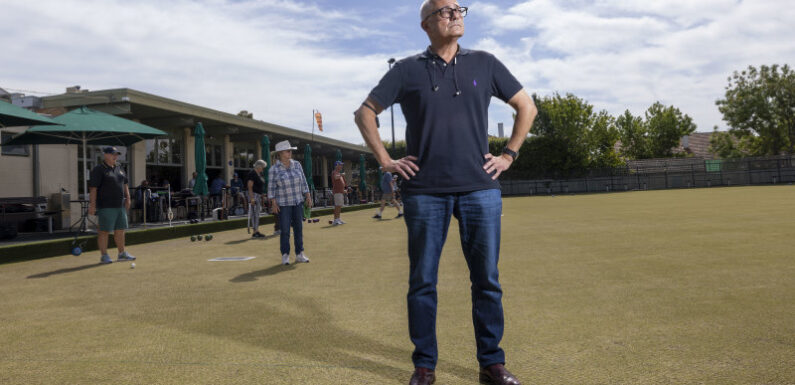
Save articles for later
Add articles to your saved list and come back to them any time.
The Elsternwick Club is similar to many local clubs across Australia: it is set in a fine old building on a quiet suburban street, offering members lawn bowls, billiards and a member’s bar, while poker machines keep the whole thing financially afloat.
But what makes the Elsternwick Club unusual is that its board will try to sell the club for $15 million to a buyer it won’t publicly disclose. And all because the club’s legal commitments to pay for its poker machine entitlements is slowly squeezing the financial life out of it.
Member Peter Stathis of The Elsternwick Club opposes a sale of the club. Credit: Wayne Taylor
The club, located in Melbourne’s south-east, has fallen on hard times. The roof needs repairs, the restaurant – described as a “great gem” – is closed. The punters left during COVID-19 and never came back.
Secrecy surrounds the proposed sale of its premises at 16 Sandham Street, Elsternwick. Some members question the sale process and its speed. But others feel the sale is in the best interests of the club and believe members will probably approve it.
At a special general meeting on Wednesday, the club’s board hopes to sell the venue for about $15 million – but it won’t reveal the buyer’s identity to members unless they sign a non-disclosure agreement. Nor has the board publicly detailed how the money will be distributed if the sale proceeds.
“It’s disappointing that a community club of heritage significance dating back to 1899 has fallen victim to gaming machine entitlements and is on the brink of closure,” said David Southwick, the MP for the electorate of Caulfield which includes Elsternwick.
The Elsternwick Club is housed in the historic villa Stanmere. Credit: Wayne Taylor
Southwick said the local council – the City of Glen Eira – or the state government should step in and “ensure this community asset remains in community hands”.
A spokesperson for Glen Eira City said the council could not comment on whether it was aware of the sale, approved of the sale or was aware of the process for the proceeds of the sale because the matter was “commercial in confidence”.
The area and the historic villa the club is housed in, Stanmere, is covered by heritage overlays.
“A planning permit would be required to demolish the building and to construct more than one dwelling on the land,” the spokesperson said.
Late last week, a source with knowledge of the sale, who declined to be named, said the buyer was likely Glen Eira City Council. The council declined to comment.
The club began as a men-only club in 1899 above a shop on Glen Huntly Road. It moved to Stanmere, a grand Italianate villa, in 1919. When The Age visited last week, about 20 members were enjoying practice session of lawn bowls in the sunshine – in contrast to the gaming room, which was devoid of members.
Social club member Peter Stathis opposes the sale.
“Why would you lose this? This soul, the culture that you see here, the characters that you see inside,” said Stathis, who has not signed the non-disclosure agreement and does not know the identity of the potential purchaser. “I’m heartbroken.”
Gaming revenue at the club collapsed after punters failed to return after the COVID-19 lockdowns. But the club must pay quarterly gaming entitlements of $34,000 for about 30 machines after signing a long-term contract, a process supervised by the Victorian Gambling and Casino Control Commission.
The club is generating insufficient cash to cover this cost. Last financial year, the club reduced its losses to $74,000 down from $237,000 the year prior on revenues of $1.2 million, according to the former president’s annual report in March. But gaming entitlements were deferred and exiting gaming would cost the club an estimated $1.5 million.
Club member Michael Galileos opposes the sale but said he would respect Wednesday’s vote. He was unable to attend the club’s information meeting.
“All this has happened very quickly. There were no minutes sent of the initial [information] meeting.”
David Stephenson, president of the club’s board, refused to reveal the identity of the buyer to The Age and said the board signed a commercial in confidence agreement.
The club’s 2013 constitution states that any property left over after selling the club “shall not be paid to or distributed amongst the members but shall be given or transferred to some other organisation having purposes similar to the purposes of the club”.
Stephenson refused to detail that process but said the board would observe the constitution and was committed to high standards of governance.
“It is a club matter. It is for the members to decide,” he said. “The board is very mindful of looking after the best interests of the members moving forward.”
In September, the club wrote to Gaming Minister Melissa Horne about its financial woes and its difficulties in paying its gaming entitlements.
A state government spokeswoman declined to comment on the club’s circumstances but said: “Venues experiencing financial difficulties have several options available to them including selling their entitlements on the transfer markets or applying for financial hardship provisions.”
It is understood the club did not apply for hardship provisions.
There are about 100 club members. The Wednesday meeting needs only five per cent to achieve a quorum and a simple majority vote to agree to the sale.
Get the day’s breaking news, entertainment ideas and a long read to enjoy. Sign up to receive our Evening Edition newsletter.
Most Viewed in National
From our partners
Source: Read Full Article

